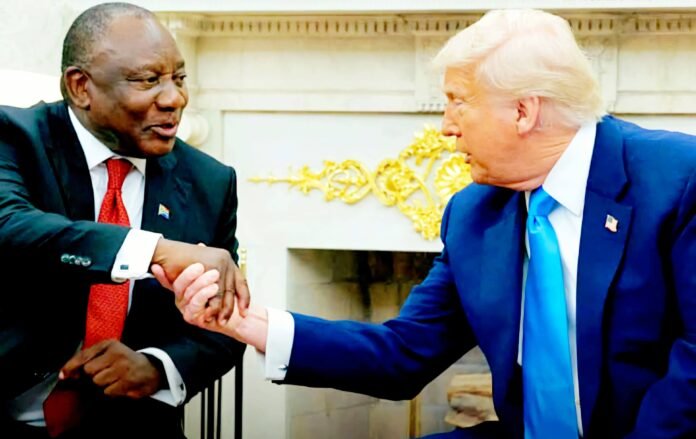The diplomatic tension between Washington and Pretoria has reached a fever pitch as the US Congress advances the US-South Africa Bilateral Relations Review Act of 2025 (H.R.2633).
The bill, introduced by Texas Republican Representative Ronny Jackson, seeks to review bilateral relations and identify ANC leaders and government officials eligible for sanctions.
“Today, my bill to fully review America’s relationship with South Africa and give President Trump the tools necessary to hold their corrupt government accountable passed through committee,” Jackson declared after the House Committee on Foreign Affairs passed the motion by 34 votes to 16.
“The days of allowing our so-called ‘allies’ to walk all over us are over. South Africa made its choice when it abandoned America and our allies and sided with communists and terrorists.”
What’s in the Bill?
The bill, first tabled on April 3, 2025, calls for a comprehensive reassessment of US-SA relations, accusing Pretoria of “troubling shifts” in foreign policy. The legislation cites South Africa’s growing alignment with China, Russia, Iran, and Hamas, as well as its controversial genocide case against Israel at the International Court of Justice.
Washington has grown increasingly frustrated with Pretoria’s stance on global conflicts, including its decision to host joint naval drills with China and Russia, and its downgrade of diplomatic ties with Taiwan.
Trump’s hardline approach
The bill’s progress underscores President Donald Trump’s aggressive foreign policy posture toward South Africa. His administration has already cut US aid, expelled South Africa’s ambassador, and slapped 30% tariffs on South African exports, threatening to derail trade relations.
This follows months of escalating rhetoric, including Trump’s unsubstantiated claims of a “white genocide” in South Africa, which sparked rallies among Afrikaner communities.
Read: White victimhood in question as throngs of Afrikaners rally in Pretoria in support of Trump.
Meeks slams Bill as ‘hypocritical’
Democratic Congressman Gregory Meeks criticized the sanctions bill and Trump’s actions during an interview with eNCA:
“President Donald Trump had already disproportionately targeted South Africa,” Meeks said. “He attempted to embarrass President Ramaphosa with faulty evidence of purported atrocities and instituted an executive order to cut all US assistance to the country.”
Meeks called out what he described as “glaring hypocrisy”, noting that while special refugee programs were created for South Africans, refugees from other crisis zones were blocked:
- “Refugees from Sudan fleeing genocide were not allowed.”
- “Refugees from Ukraine fleeing Russian bombardments were not allowed.”
- “Refugees from Venezuela fleeing political persecution were not allowed.”
He concluded:
“Congress should not further enable or double down on President Trump’s misguided approach.”
Watch the interview: eNCA video.
Ramaphosa’s Washington gamble
President Cyril Ramaphosa’s attempts to mend ties with Washington have faltered, despite his recent visit to the White House. His “Washington gamble” temporarily boosted the rand, but it failed to defuse tensions with Trump.
Ramaphosa’s team has accused the Trump administration of orchestrating a “political setup” during his Oval Office visit.
Read: A well-orchestrated operation: Ramaphosa team cries foul over Trump Oval Office setup.
AfriForum and Solidarity welcome US pressure
South African civil rights groups AfriForum and Solidarity have expressed cautious support for the bill.
AfriForum’s PR head Ernst van Zyl said:
“This development comes amid a deepening diplomatic crisis between the US and South African governments. Last week it was reported that the US government has denied Mcebisi Jonas, South Africa’s special envoy to the US, a diplomatic visa and rejected his credentials.”
Solidarity’s Jaco Kleynhans urged Ramaphosa to reaffirm South Africa’s non-aligned position:
“It is impossible to resolve the current political crisis between the two countries without a strong South African ambassador to the US. Jackson’s Bill calls for a comprehensive process whereby the relationship between our two countries must be reviewed. Without an ambassador, such a process will lead to disastrous consequences for South Africa.”
Kleynhans also called for stronger commitments to property rights and minority rights, warning that Trump’s administration would not tolerate South Africa’s “expropriation without compensation” policies.
Will the Bill pass?
Despite its passage through the Foreign Affairs Committee, experts doubt the bill will survive the Senate.
Professor John Stremlau, Honorary Professor of International Relations at Wits University, believes the effort is “dead in the water.”
“Even if the bill passed the House like the previous version, there is no prospect for the Senate to pass this bill which would be filibustered by the Democrats,” Stremlau said.
However, analysts warn that the bill — even if symbolic — reflects Washington’s eroding patience with Pretoria’s foreign policy and could pave the way for tougher trade and diplomatic measures.
Crossroads of power and politics
South Africa insists it remains non-aligned, yet its deepening ties with BRICS have placed it on a collision course with the US. Trump’s administration continues to criticize South Africa’s genocide case against Israel and land reform policies.
Read more: Trump imposes sanctions on South Africa, cuts aid over land expropriation and ICJ case against Israel.
With tensions mounting, both nations stand at a crossroads that could redefine their relationship for decades.

